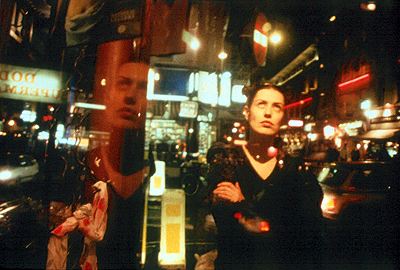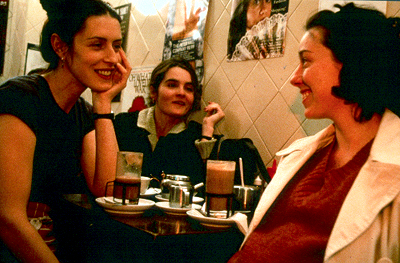

People say that England is depressing, and if Wonderland is anywhere near the truth, Americans should rejoice that they won the Revolutionary War. The fact that it is depressing does not make Wonderland a bad movie; it is an interesting look into what people do to cope and how they look for hope in their bleak lives. The film follows three sisters and the people that interact with them in their lives over a three-day period.
Nadia (Gina McKee, Croupier, Notting Hill) works as a waitress in a coffee shop. She looks for dates by listening to an endless stream of personal messages, and tries dating ones that sound interesting. She is lonely and looking for something that will help connect her to this world. It does not help that everywhere she goes, she sees couples and people having fun. Her sister Molly (Molly Parker, Sunshine, The Five Senses) is pregnant with her first child. Her husband Eddie (John Simm, Human Traffic, Understanding Jane) is getting nervous about becoming a father. Their relationship is not as deep as Molly things. The final sister is Debbie (Shirley Henderson, Topsy-Turvy, Rob Roy), a hairdresser and single mother. Her ex-husband is incapable of taking care of her son.
Part of what makes Wonderland interesting is its Dogma 95 style of filming. The film quality is not great, and the camera frequently wanders all over the place, taking in surrounding buildings and onlookers. Even when it is focused on an actor, the camera does not sit still. This gives Wonderland a voyeuristic feel, as if audiences are walking next to the actors. There is a lack of "proper" film lighting, and no soundtrack except for a good classical score by Michael Nyman. Director Michael Winterbottom (Jude, Welcome to Sarajevo) and screenwriter Laurence Coriat take many stories and weave them together well, giving enough time to each character to develop personalities that differentiate them from each other. And there are more than a few actors. Each sister has a foil, and two have children. Their parents also live a dreary existence; their mother hates the father and complains all day about the neighbor's barking dog, and their father just does not seem to care about anything.
Winterbottom also employed a documentary style of filmmaking, which did not throw off any of the actors. They all perform ably, believably grasping on to the last straw of hope. When McKee sits in a bus with a tear slowly falling down her cheek, the feeling is real. The same happens with Simm, practicing what to say to Parker on a bridge. They all act surprisingly naturally, again giving a realistic view of the events. It takes a while to get into Wonderland, but once that happens, the remainder of the film develops into an odd, compelling rhythm.